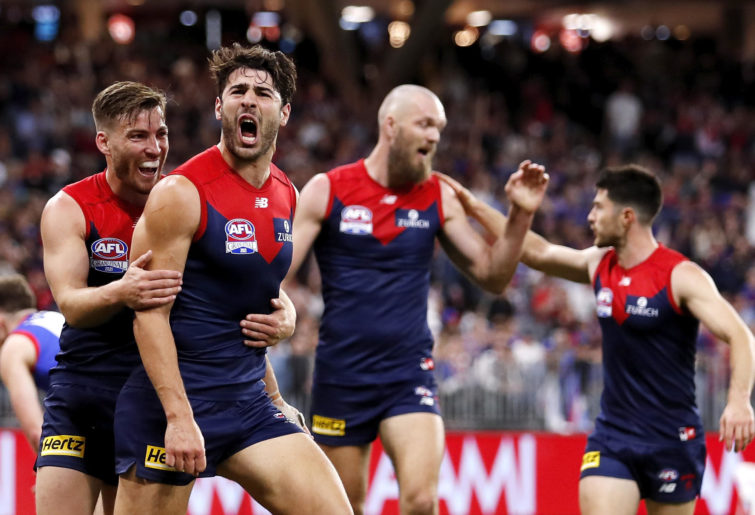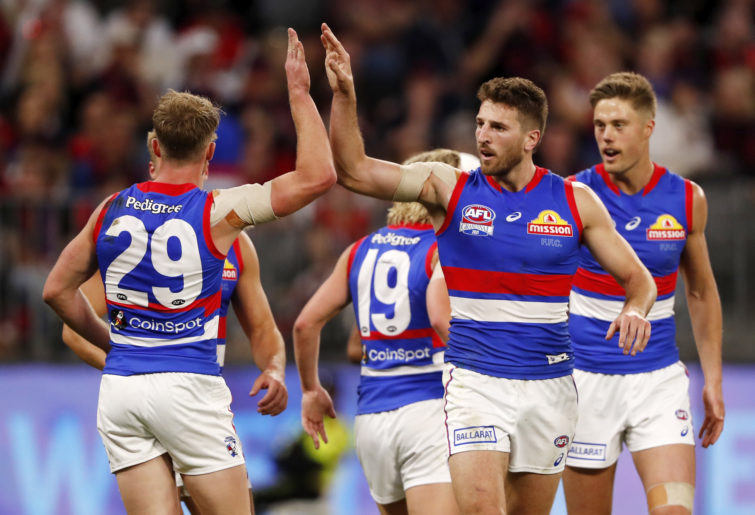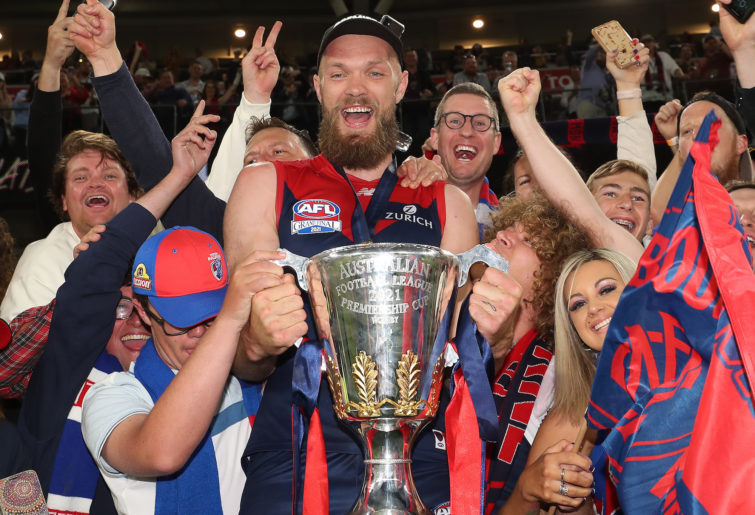'Let yourself down': Andy Maher cops brutal Front Bar roasting for massive Blues Radio anti-ump tirade
The Blues Radio caller wasn't happy when the Demons Caleb Windsor was not pinged for holding the ball - and his Front Bar co-hosts…
Opinion
The AFL’s longest active drought is finally over, as well as the so-called curse of Norm Smith, after Melbourne thrashed the Western Bulldogs by 74 points to win their first flag since 1964, and 13th overall.
For the second consecutive year, a COVID-19 outbreak in Victoria prevented the match from being played at its traditional home, the MCG, in a COVID-safe manner. Therefore the decision was made to stage the game in a twilight time slot at Optus Stadium in Perth.
This was made possible due to Western Australia’s extraordinary success in keeping coronavirus out of the state, which was attributed to premier Mark McGowan and his Labor party retaining government in a landslide at the state election earlier this year.
The word ‘landslide’ could also be appropriately used to describe how the Melbourne Football Club smashed their 57-year premiership drought and buried their premiership demons in the process.
Those who were lucky enough to witness this historic occasion in Perth were treated to a Melbourne masterclass as they conjured a 93-point turnaround from early in the third quarter to win by their biggest margin ever in a grand final.

(Photo by Dylan Burns/AFL Photos via Getty Images)
Simon Goodwin’s men went into the grand final as hot favourites, after finishing on top of the ladder for the first time since 1964 (thanks to a Max Gawn goal after the final siren against the Geelong Cats at Kardinia Park in the final round) and then defeating the Brisbane Lions and Geelong Cats in the qualifying and preliminary final, respectively, to reach the big dance for the first time since 2000.
Standing in their way were the Western Bulldogs, who overcame a late-season form slump, and the loss of leading goal kicker Josh Bruce to a season-ending ACL injury in that period, to win three consecutive sudden-death finals and advance to their second decider in six years.
Both sides had won their respective preliminary finals in brutal fashion, with the Dees reversing years of humiliating defeats by the Cats with an 83-point demolition job and the Bulldogs hammering Port Adelaide by 71 points on their home turf.
Thus, it was difficult to predict a winner with any real confidence, though many commentators and experts sided with the Dees on the basis of their more dominant form throughout the season.
Christian Petracca booted the game’s first goal, and the Dees kicked five of the six majors in the first quarter to go into quarter-time ahead by 21 points.
But just when Simon Goodwin’s side looked to run away with it, the Bulldogs turned the match on its head, with two goals from Adam Treloar early in the second quarter to take control of the match and take an eight-point lead into halftime.
When Jason Johannisen and Marcus Bontempelli, two of the few players remaining from the 2016 premiership side, each goalled in the early stages of the third quarter, the Dogs held a 19-point lead by the 13-minute mark, and appeared well in cruise control.

(Photo by Dylan Burns/AFL Photos via Getty Images)
However, the Dees would rediscover their first-quarter form to boot the last seven goals of the quarter and go into the final change of ends 24 points to the good, and were just one quarter away from finally smashing the curse of Norm Smith once and for all.
They did not let up in the final quarter of the season, and booted another five goals to make it 12 straight before Treloar, who had turned the match around for his side in the second quarter, pegged one back for the Scraggers.
Four more goals to the Dees completed the carnage, and after Tom McDonald kicked their 21st and final goal of the match right on the final siren, celebrations started going off among the Melbourne supporters at Optus Stadium, and the households of those around the country.
It was only appropriate that the club capped off easily their most dominant season in modern history with a grand final masterclass, kicking 16 of the final 17 goals of the game in a stunning 16.4 (100) to 1.1 (7) run from midway through the third quarter.
Christian Petracca became the club’s first ever Norm Smith Medallist, his 40 possessions being the most by any player in a grand final since Simon Black in 2003, while Bayley Fritsch became the first player since Darren Jarman in 1997 to kick six majors in a decider.
Defender Jake Lever’s move to Melbourne at the end of the 2017 season was also vindicated with a premiership medal, four years after being part of the Adelaide Crows side that were embarrassed by Dustin Martin and the Richmond Football Club on the big stage.
It was also the perfect celebration for ex-co-captain Jack Viney, the only player in the grand final side given his debut by Mark Neeld during the awful 2013 season that returned just two wins, in his 150th AFL game.
The Dees’ 13th overall premiership puts an end to nearly six decades of misery in which the club was mired in just about everything that could possibly have gone wrong.

(Photo by Paul Kane/Getty Images)
After the club last saluted in 1964, captain Ron Barassi made the shock defection to Carlton, and then halfway through the 1965 season coach Norm Smith was suddenly sacked only to be reinstated a week later.
The Dees would then endure a 23-year finals drought, not qualifying for the post-season playoffs again until 1987 when they got as far as a preliminary final where they lost a heartbreaker against Hawthorn after Jim Stynes had given away a 15-metre penalty right at the death.
While they would reach the grand final the following year, they’d be on the wrong end of a masterclass by the Hawks, losing by a then-record 96 points.
A merger with the Hawks was in the works, but members of both clubs vehemently opposed it, and the Dees, despite beating reigning premiers North Melbourne in Round 1, would crash to a wooden spoon finish the following season in 1997.
Neale Daniher was hired as coach at the end of that season and would do his best to keep the club afloat going into the new millennium, taking them to a decider in 2000 where they were badly beaten by an Essendon side that was the most dominant of the season.
Young defender Troy Broadbridge then tragically lost his life during the Boxing Day tsunami in Thailand, and the club dedicated their 2005 season, which ended with a heavy elimination final loss to the Geelong Cats at the MCG, to their fallen comrade.
After Daniher departed halfway through the 2007 season, Dean Bailey was appointed as coach, during which he rebuilt the playing list to a significant degree, resulting in consecutive wooden spoon seasons in 2008 and 2009.
It was during this time that club president Jim Stynes announced that he had developed cancer, further complicating the club’s on-field struggles.
The club appeared to improve in the ensuing years, until July 30, 2011 rolled around – a date when the club suffered a near-record 186-point thrashing at the hands of a very powerful Geelong Cats side at Kardinia Park.
It meant that the club had laid claim to the two worst losing margins in VFL/AFL history, having also lost to Fitzroy by 190 points in Round 17, 1979.
Bailey was given his marching orders, after which Collingwood assistant Mark Neeld was hired as the club’s new coach. Upon his appointment, he infamously vowed to bring a hard edge to the club.
More tragedy struck the club when Stynes succumbed to his cancer in March 2012, and his death caused a psychological and mental effect on the players as they crashed to a 16th-place finish with just four wins for the season.
Neeld was dismissed halfway through the 2013 season as the heavy defeats piled up (most notably a 148-point thrashing by Essendon after which the players were verbally abused as they trudged off the MCG), and the club appeared to be heading nowhere.
That was until Peter Jackson and Paul Roos were appointed CEO and coach, respectively, with the long-term view of turning the club’s on-and-off field fortunes around and making them a destination club.
The club slowly but surely improved in the three seasons that Roos was coach, during which time Simon Goodwin was brought onboard to act as Roos’ successor following the 2016 season.
Under Goodwin, the club narrowly missed the finals in 2017 but progressed to reach a preliminary final the following year where they copped a 66-point thrashing by the West Coast Eagles at Optus Stadium before crashing to a second-last place finish in 2019.
After another season without finals in 2020, Goodwin entered the 2021 season under immense pressure, but he embraced it, and the players developed a newfound attitude and game plan that saw them win their first nine games of a season for the first time since 1956.
Despite a mid-season slump, the club would finish on top of the ladder for the first time since 1964 and, as already mentioned above, emphatically ended the curse of Norm Smith with a crushing victory over the Western Bulldogs in the final match of the season.
The final margin of 74 points is the club’s biggest in a grand final, and they are also the first club since Hawthorn in 2013 to achieve the minor premiership-premiership double in the same season.
As for the Western Bulldogs, it was a bitterly disappointing end to a season that had seen them pick themselves up after a late-season slump to reach the grand final from fifth place, being the first club to do so since the Adelaide Crows in 1998.
Ultimately, the club’s extensive travel itinerary, which saw them play finals in Launceston, Brisbane, Adelaide, and finally Perth, caught up to them as they crumbled under the Dees’ tackling and scoring pressure.
It meant several players, including Marcus Bontempelli, Jason Johannisen and Lachie Hunter, among others, failed to add to the 2016 premiership they won with the club, while Taylor Duryea missed out on a third premiership medal after featuring in Hawthorn’s 2014 and 2015 premiership sides.
While it is the first premiership since 2012 to not be won by either Alastair Clarkson or any coach that plied their trade as an assistant under him, it is the tenth straight flag to have either his or Paul Roos’ DNA on it.
Roos, who led the Sydney Swans to a 72-year drought-breaking flag in 2005, has now seen two of his former assistants – John Longmire with the Swans and Simon Goodwin with the Dees – lead their respective sides to flags in 2012 and this year.
Thus, you could consider the Dees’ premiership to be a tribute to not just Roos, but also Peter Jackson, both of whom, as mentioned above, were hired to resuscitate the club in 2013.
Congrats to the Dees ???? A premiership well deserved. After being down 40-59 the Dees stormed home with a 100-7 run! ????
And a shout out to Paul Roos who helped set this up many years ago and transitioned this team to Simon Goodwin’s team, much like Longmire with the Swans #AFLGF https://t.co/cRh4wObA1T
— Victor Leung (@victorleung) September 25, 2021
This premiership is a tribute to Paul Roos and Peter Jackson, who both helped to turn the club around at its lowest ebb in 2013. #AFLGF #AFLDeesDogs #AFL #7AFL
— Avatar (@Avatar5991) September 25, 2021
It is also a tribute to past and present club legends, including Garry Lyon, David Neitz and Brad Green, while special mention was made to Nathan Jones, who after racking up his 300th game in Round 6 this year struggled to break back into the side.
One of the great modern-day warriors of the game could’ve easily quit Melbourne and chased the ultimate success elsewhere, but he remained loyal to the red and blue and led the club with his heart during those awfully difficult times.
When it became obvious he couldn’t force his way back into the side, he made the decision to retire but not before returning to Victoria for the imminent birth of his twins.
So while he missed out on the ultimate success, he will be remembered by the club for the hard work he did in returning the club to where they are now.
During his post-match interview with Channel Seven, captain Max Gawn also made mention of Jim Stynes, Troy Broadbridge, Dean Bailey and Colin Sylvia, four Melbourne figures who tragically lost their lives this century.
Gawn was the only player in the Melbourne side that was given his debut by Bailey, who passed away in 2014 after a battle with lung cancer, as well as one of two debutants from 2011 (the other being Tom McDonald, who debuted four weeks after Bailey’s dismissal that year).
Eight years after then-CEO Peter Jackson labelled the club “an impediment to the industry”, the club is now revelling in the ultimate success, and it is the ultimate reward for the club’s long-suffering supporters, who stuck with them through all the difficult times.
History made. ✨
2021 Premiers. ????#GiveEmHell | #AFLGF pic.twitter.com/cWsJxCDhjE
— Melbourne Demons (@melbournefc) September 25, 2021
With the club’s 57-year premiership drought smashed, it now means St Kilda has assumed the unwanted honour of having the league’s longest active premiership drought, 55 years having passed since their solitary flag in 1966 (which they won by beating Collingwood by a solitary point in the grand final).
It brings to an end a second straight season impacted by the COVID-19 pandemic, with several matches in Victoria played behind closed doors, others moved to neutral venues (including the relocation of two Dees matches to Sydney) and the finals played outside of the state.
Just when some sense of normality was being restored to Australian lives after the challenging 2020 season, the virus was somehow able to find its way back into the community, resulting in most states reinstating border closures and several teams being sent around the country.
Despite all the challenges that were faced against them, the AFL has again managed to complete the season, mostly unimpeded, and crown a well-deserving premier in the Melbourne Football Club.
As the vaccine rollout continues its rapid momentum, it’s expected that, by the start of next season, border closures and travel restrictions should become a thing of the past come the start of the 2022 season, but WA’s hard border could continue to prove a major impediment.
From Wednesday this week, all but the most absolute essential travel from New South Wales and Victoria into the state will be banned, but how that impacts next year’s season remains to be seen.
To finish off, congratulations to the Demons, who have deservedly won their 13th premiership in emphatic fashion and commiserations to the Western Bulldogs, who did well to qualify for their second grand final in six years, and fourth overall.